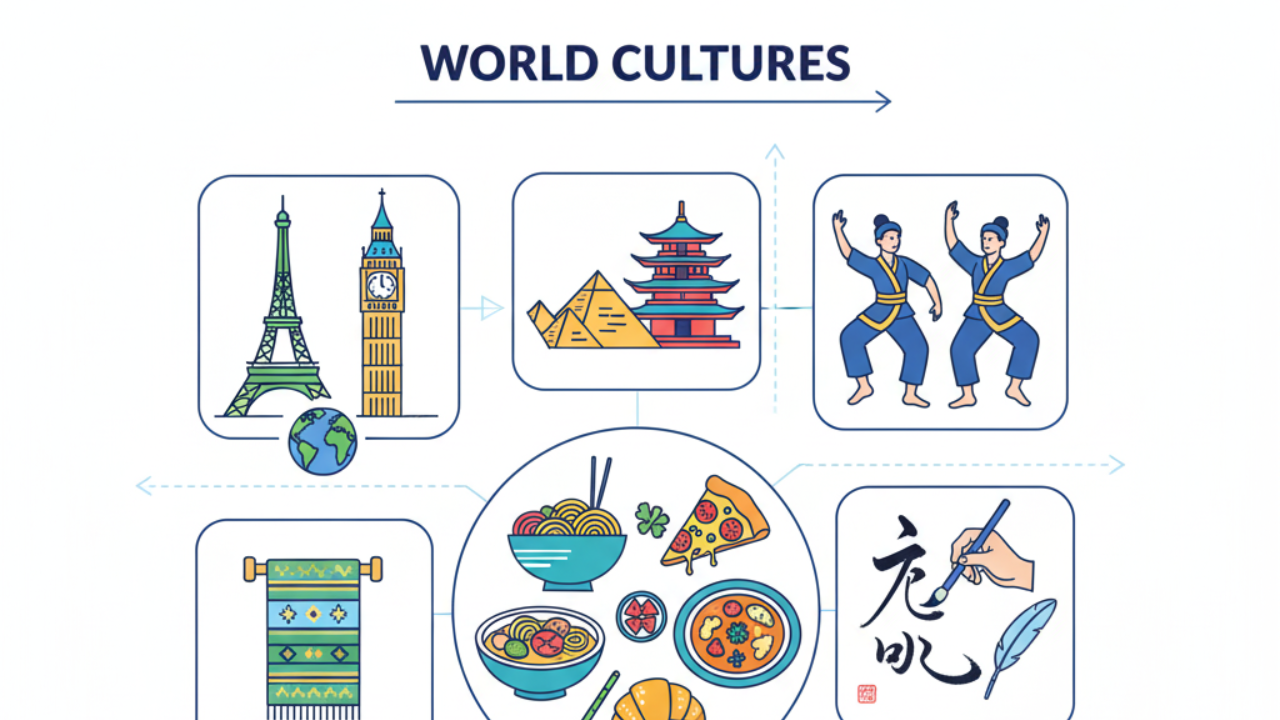What is culture and why does it matter?
On the face of it, it sounds like two easy questions, but it’s actually a little tricky to define.
The thing is, culture is such a big part of our daily lives that it’s can be hard to separate it from other concepts. It’s one of those things that we just accept as being there, without thinking too much about it.
Well, that is exactly what I’m looking to do with you today.
I want to try to come up with a definition of culture and find out why culture is important in society. Is it something fundamental, or there to help the economy?
Carry on reading to find out more!
What does culture mean?
As a culture blogger, I’m always talking about, well, culture (groundbreaking I know), but what does that actually mean?
Before I started researching this blog post, I always thought I knew exactly what culture was. My definition centred around the ways and means of a group of people. I thought it encompassed everything from the rules that governed us to our long-standing traditions. I even included ways we express ourselves such as through the Arts.
Turns out, this definition isn’t far off!
Let’s start with the Oxford Dictionary. According to this, culture means “the customs, beliefs, art, way of life and social organizations of a particular country or group”. Another definition is “the arts and other manifestations of human intellectual achievement regarded collectively”.
The University of Minnesota has gone one step further, stating that culture is “the shared patterns of behaviours and interactions, cognitive constructs and affective understanding that are learned through a process of socialisation. These shared patterns identify the members of a culture group while also distinguishing those of another group”.
In fact, the University shared a list of academic texts, all of which mentioned the idea that culture is both learned and shared as integral elements.
Here’s a question to think about: if culture is learnt, can it be changed or are you starting a new culture by going against tradition and history?
It’s also important to point out that culture refers to a specific group or category and not an individual.
Hofstede (1994), differentiated culture from personality and general human nature. In his book “Cultures and Organisations: Software of the Mind”, he explained that:
- Human nature was inherited and something all humans are born with. E.g. the desire to communicate.
- Personality is specific to an individual person but can be both inherited and learned. You often hear of people saying your behaviour is similar to that of your relatives. This might be because of genetics, but also that you’ve learnt it from them too.
- Culture is like the middle ground between the two. It’s not unique just to one person like a personality, but it’s also not shared by all humans either. You’re also not born with an instinctive knowledge of the culture. Think of children born in a different country from their parents. The parents often teach them about the culture from their birth country to pass on cultural traditions to the next generation.
What does culture include?
When we talk about culture, we’re usually using it as an umbrella term that covers a multitude of things. This in itself makes a definition for culture quite hard to pinpoint but it’s quite a broad concept.
Some of the things that culture can include are:
- Clothing
- Food & Drink
- Performing & Visual Arts
- Books & Literature
- Sports & Games
- History, Festivals, Customs & Traditions.
Really narrows it down doesn’t it?!
What makes the idea of culture so difficult, is that when people talk about culture, they might be referencing just one aspect listed above, or all of them at once.
You often hear this when people talk about The Arts (another umbrella term used for means of expression such as dance, drama, writing, film & music). Talk about confusing!
The different types of culture
Aside from the different things included under the culture umbrella, you also have different subtypes of culture as well.
As I said earlier, culture is about specific groups of people, so it makes sense that different groups of people will have different cultures. That’s why our towns & cities have become multicultural, with many cultures coexisting alongside each other.
Cultural identity can be centred on pretty much anything, the most common being based on geography (National identity, regional differences), religion, ethnicity or interest.
Other types of culture you might have heard of are:
- Cafe culture – the idea of society centred around visiting cafes.
- Consumer culture – capitalist culture based on buying things to achieve a certain lifestyle.
- Corporate culture – the culture experienced within an organisation or business.
- Diet culture – the idea of society centred around dieting and weight loss.
- Drinking culture – behaviours that are associated with drinking alcohol.
- Lad culture – the idea of behaviours deemed overly masculine.
- Popular culture/ Pop culture – Cultural activities that are deemed popular by a lot of people doing it or liking it.
- Political culture – how culture has affected the political landscape.
You can also group cultures by subcultures i.e. a culture inside a more generalised culture. Some examples of this are:
- Drag
- Gamers
- Glam rock
- Hippies
- Hipsters
- Indie
- Manga
Why is culture important?
By now you should have a pretty good idea of what culture means. You should also be able to give a few examples of what it includes and the different subgroups.
But why is this important? Why should we care about culture in the first place?
What I Think
I know I might be biased (being a culture blogger and all), but I think that there are so many reasons why culture is important to us.
#1 – Culture gives us a sense of belonging & security
Celebrating shared culture with other members of your social group helps you embrace your similarities and feel secure. That strength in numbers mentality will help you to feel confident with your cultural identity and less lonely.
#2 – Culture is a great educational opportunity
Celebrating culture isn’t just about focusing on your own experiences and heritage. Culture can be a powerful tool to engage other groups in society to build tolerance and understanding.
One really good example of this is when religious groups invite people of all backgrounds to celebrate with them during religious festivals. They’re opening the intercultural dialogue to remove any misunderstandings or assumptions.
There are so many different cultures in the world so there’s always something new to learn. Every time you educate yourself, you’re developing respect for others and going beyond the stereotypes. On a larger scale, this can help prevent (and overcome) any divisions and increase cultural sensitivity.
#3 – You’ll build self-awareness
The self-awareness you develop through culture happens on three levels:
On a personal level, you’ll be able to explore your own identity much better.
You’ll also feel a part of something much bigger than yourself. This will help to give you perspective on your role within society.
Lastly, on a bigger scale, you can see how your cultural group fits in with the rest of the World. Whilst there are many different cultures, there are also lots of similarities too.
#4 – Culture empowers and encourages contributions
The understanding and respect that comes from cultural awareness mean that you are much more likely to be able to communicate with different groups in a respective and effective way. In a multicultural world, this is key to every-day life.
It’s this respect and appreciation of other cultures that empowers minority groups. Feeling secure in their identity, they’re able to celebrate their culture and are encouraged to contribute to the wider society. They will feel included and any divisions or barriers are less likely.
The more different cultural groups contribute, the more people will be able to learn about them, creating a positive cultural cycle.
# 5 – Culture offers new opportunities and development
Culture offers so many new opportunities and experiences that make the world such an interesting place to be a part of.
Just think how boring it would be if we were all the same. You’d visit new countries but wouldn’t have any new cuisines to try, or traditions to learn about. Music would all be the same genre and no one would have a different perspective on topics.
But, with differences, you’re able to explore countless cultures and celebrate their unique aspects.
What other people think
Before I finish this blog post, I thought it would be interesting to see what other bloggers think about culture.
Dave from Dave Does The Travel Thing
“What I love about exploring culture is how diverse it can be. It’s fun to enjoy different experiences, to see and sample a destination’s art, music, architecture, food and much more. I also think it’s fascinating to learn how a place’s cultural history has shaped its present day.”
Bob from Amateur Emigrant
“It’s an area I think about a lot ‘ways of seeing’. We take a lot more with us than baggage and ‘culture’ is the main influence – Michael Jackson posters and slightly stretched cassettes playing in Leh, Ladakh in quite a remote India, or the boom in banana pancakes in Lhasa!
I’d say culture is like a bubble of accepted values in a (usually) geographically defined area in origin. It now denotes the same in an abstract, (even virtual now), environment. E.g. Facebook groups for finely delineated interests !”
Rachel from Rach Talks Business
“I love to think of culture as bringing people together. Whether that be through behaviour, language, beliefs, ideas or religion. It is what connects a group of people with similar passions or life paths. I feel like culture brings together people who were meant to meet each other.”
Ian from The Barefoot Backpacker
“Culture is what makes a society. It’s a baseline defining what a group of people have traditionally found important, or what has been important in the development of that group. It could be something material, something spiritual, even something stylistic. Sometimes it serves to define the group to outsiders, and may be unique to a location or community – indeed it may be the most well-known thing about that group. To an outsider, a place or group’s cultural identity can be fascinating, as it’s often different to their own, but it should never be dismissed just because it’s different.
Culture can be anything from beetroot soup (Slavic/Russian lands), to morris dancing (England), to bowler hats (“Wild West” Cowboy culture), to large midday meals (France); it’s ill-defined, covers all manner of different aspects, and yet everywhere and everyone has something that can be identified as special or specific. The danger comes in relating that group entirely by purely one aspect of their culture – that way lies the stereotype.”
I hope you’ve found this blog post interesting. I’ve always loved writing these opinion posts so hopefully, this will be something I do more of in the future.
What do you think? What is culture and why does it matter? Let me know in the comments below!


